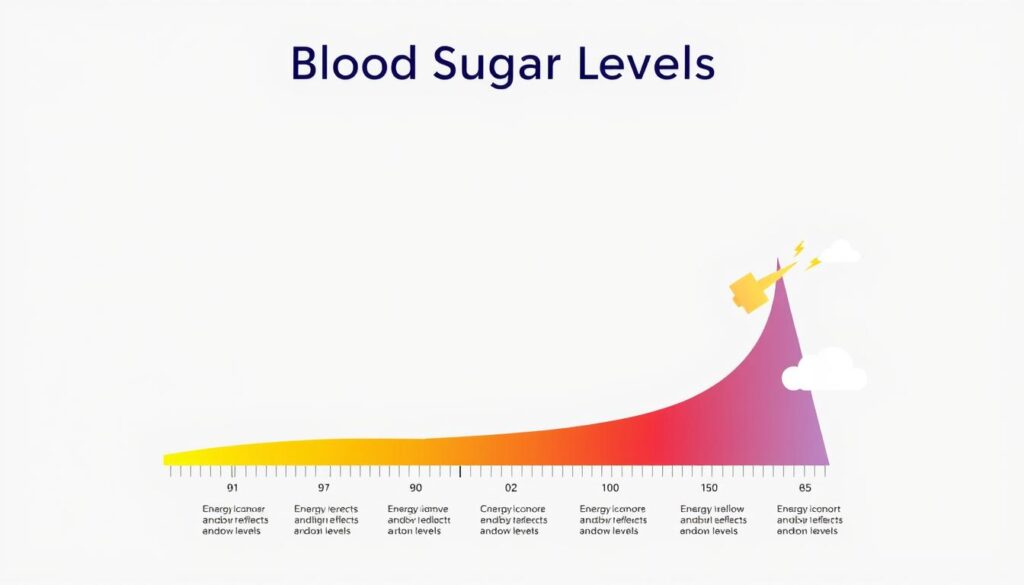Ever felt really tired or sleepy all the time? It might be because of your blood sugar. High blood sugar, or hyperglycemia, is common in people with diabetes. It makes you feel very sleepy and tired.
Actually, up to 68% of people with diabetes say they feel very tired. This tiredness is not just from not sleeping enough. It’s a deeper feeling that doesn’t go away with rest.
This guide will look at how high blood sugar makes you feel sleepy. We’ll talk about why it happens, what symptoms to watch for, and how to feel better. We want to help you get your energy back and feel better overall.
Key Takeaways
- High blood sugar can cause fatigue and drowsiness in people with diabetes and even those with normal or prediabetic levels.
- Certain medications used to treat diabetes complications may also contribute to feelings of tiredness.
- Proper diabetes management, including diet, exercise, and stress reduction, can help control blood sugar levels and improve energy levels.
- Persistent fatigue lasting more than two weeks or accompanied by other symptoms should prompt a visit to a healthcare provider.
- Living with diabetes can impact mental and emotional health, making it important to address both physical and psychological factors.
Understanding the Connection Between Blood Sugar and Sleepiness
Ever felt really tired after eating? It’s not just you. Blood sugar and energy levels are closely linked. Knowing this can help you stay awake and sleep better.
The Science Behind Blood Sugar Fluctuations
Carbs turn into glucose in your body. This makes your blood sugar levels go up. Your pancreas then makes insulin to move glucose into your cells.
If your body can’t use insulin well, you get glucose spikes and fatigue. This can make you feel very tired and weak.
How Insulin Affects Energy Levels
Insulin is key to your energy. High insulin levels make your body store glucose as fat. This can make you feel tired and sleepy.
The Role of ATP in Energy Production
Your body’s energy is stored in ATP. Low ATP means you feel very tired. Keeping blood sugar stable helps your body make and use ATP.
| Factors Affecting Blood Sugar and Energy Levels | Impact on Energy |
|---|---|
| Glucose Spikes | Leads to fatigue and drowsiness |
| Insulin Resistance | Contributes to exhaustion and low energy |
| ATP Depletion | Causes significant drop in energy and sleepiness |
Understanding blood sugar, insulin, and energy is key. It helps fight sleepiness and boosts your health and energy.
Will High Blood Sugar Make You Sleepy: The Direct Impact
High blood sugar can make you feel very sleepy and tired. When your blood sugar goes up, it changes your body in ways that make you feel weak.
One big reason is dehydration. Your body loses a lot of water when it tries to lower sugar levels. This can make you feel tired, have headaches, and lack energy.
Also, trying to lower sugar crash tiredness takes a lot of energy. Your pancreas works hard to make insulin. This is hard work for your body and can make you feel very tired.
Long-term high blood sugar can also hurt your blood vessels and nerves. This makes it harder for your body to get the energy it needs. You might feel very tired and weak.
People with diabetes often feel very tired and sleepy. This is because high blood sugar affects their energy and health a lot.
Fatigue Levels by Gender
| Gender | Baseline HbA1c | Fatigue Levels |
|---|---|---|
| Women | Higher | Higher |
| Men | Lower | Lower |
The study found that women with diabetes have higher blood sugar levels. They also feel more tired than men. This shows that high blood sugar affects women’s energy more.
“Glucose and fatigue were significantly related in women across all levels of data (weekly, daily, and time of day) but not in men.”
This shows we need to treat blood sugar and energy issues differently for women with diabetes.
Common Symptoms of Hyperglycemia-Related Fatigue
High blood sugar, or hyperglycemia, makes you very tired. This tiredness is not just feeling sleepy. It’s because your body can’t use glucose for energy well. Let’s look at the symptoms of hyperglycemia-related fatigue.
Physical Manifestations of High Blood Sugar
High blood sugar causes many physical symptoms that make you feel tired. Some common ones are:
- Drinking a lot of water and going to the bathroom a lot
- Weight loss because your body uses muscle and fat for energy
- Blurry vision from fluid changes in your eyes
- Slow-healing sores and getting sick easily
- Numbness or tingling in your hands and feet, from nerve damage
Mental and Cognitive Effects
Hyperglycemia also affects your mind and how you think. You might notice:
- It’s hard to focus and do things
- Feeling more irritable or sad
- Feeling confused or not knowing what’s going on
Duration and Intensity of Symptoms
How long and how bad the tiredness from high blood sugar can vary. Some people feel very tired all the time. Others get tired sometimes. How bad it is depends on how high your blood sugar is, your health, and any other health problems.
If you have uncontrolled diabetes symptoms or hyperglycemia fatigue, talk to your doctor. They can help you manage your blood sugar. This can make your life better.
The Difference Between Normal Tiredness and Diabetes Fatigue
Fatigue is common, but for those with diabetes, it’s different. Diabetes fatigue lasts longer and is more severe. Unlike regular tiredness, it doesn’t go away with rest.
People with diabetes feel tired for a long time. They also might feel thirsty, need to pee a lot, and have trouble focusing. These symptoms are not like regular tiredness.
Dr. Maria Escobar Vasco, an endocrinologist, says, “Fatigue is a big problem for diabetes patients. It’s caused by blood glucose levels, not moving much, pain, not drinking enough, and mental health issues.”
About 40% of type 1 diabetes patients always feel tired. This makes it hard to do daily tasks. People with type 2 diabetes and a higher BMI also feel more tired.
“Diabetes patients are at a higher risk of developing mental health conditions like anxiety and depression, which can exacerbate fatigue.”
Managing blood glucose sleepiness helps. This includes taking medicine, eating right, drinking water, managing stress, exercising, and losing weight. Getting medical help and changing your lifestyle can also boost energy.

Feeling tired is normal for many with diabetes. But, it’s key to know the difference between regular tiredness and diabetes fatigue. By understanding and managing diabetes drowsiness, you can feel better and live a better life.
Risk Factors for Blood Sugar-Related Sleepiness
Keeping blood sugar levels healthy is key for staying awake and alert. But, many things can mess with blood sugar, making you tired. Knowing what these are can help you fight fatigue and stay awake.
Medical Conditions
Some health issues can make you feel sleepy because of blood sugar. Being overweight, heart disease, and kidney problems are big ones. They make it hard for your body to keep blood sugar steady, making you feel tired.
Lifestyle Factors
What you do every day also affects your energy. Eating badly, not moving enough, and being stressed are big no-nos. These habits mess with your body’s natural rhythm and glucose levels.
Genetic Predisposition
Genetics can also play a part. If your family has diabetes or insulin issues, you might feel tired more. Watching your blood sugar and taking steps to avoid fatigue is very important.
Knowing what makes you tired can help you fight it. Talk to your doctor to make a plan to stay awake and full of energy. This way, you can beat fatigue and stay lively all day.
“Maintaining healthy blood sugar levels is essential for maintaining consistent energy and preventing fatigue. By addressing the underlying risk factors, you can take control of your diabetes management and enjoy greater vitality throughout the day.”
How Blood Sugar Levels Affect Your Daily Energy
Your blood sugar levels are key to your daily energy. They matter whether you have diabetes or not. Keeping your blood sugar stable is vital for energy all day.
High blood sugar, or hyperglycemia, makes you feel tired and weak. It happens because your body doesn’t use insulin resistance well. This can make you very tired. Long-term high blood sugar can also hurt your nerves, causing weight loss, acid reflux, and constipation.
Low blood sugar, or hypoglycemia, makes you feel weak and confused too. Your body tries to fix this by releasing hormones. You might sweat more, have a fast heart rate, and shaky hands. Very low blood sugar can cause serious problems like disorientation, slurred speech, and even seizures or coma.
“Maintaining healthy blood sugar levels is crucial for consistent energy throughout the day. Frequent fluctuations can result in a cycle of highs and lows, affecting your productivity and well-being.”
To have the energy you need, keep your blood sugar in the right range. Your fasting blood sugar should be under 100 mg/dL. Two hours after eating, it should be under 140 mg/dL. By managing your blood sugar with diet, exercise, and medicine, you can feel more stable and healthy.

Managing Blood Sugar to Improve Energy Levels
Keeping your blood glucose levels healthy is key to feeling energetic. It helps avoid the tiredness that comes with diabetes. Eating right, exercising, and sleeping well can help manage your blood sugar and boost your energy.
Dietary Strategies
Eat a balanced diet with lots of complex carbs, lean proteins, and healthy fats. Try to do 150 minutes of cardio and two strength workouts a week to keep your blood sugar in check. Drink 6 to 8 ounces of water with every meal to slow down your blood sugar rise.
- Eat foods high in fiber like whole grains, legumes, and veggies to avoid blood sugar spikes.
- Don’t eat too much sugar, white carbs, or processed foods. They can mess with your blood sugar.
- Watch how much you eat and the food’s glycemic index to keep your blood sugar stable.
Exercise Recommendations
Exercise is vital for keeping your blood sugar in balance and boosting energy. Aim for 150 minutes of cardio and two strength workouts a week to help your body use insulin better and avoid blood sugar spikes.
Sleep Hygiene Tips
Good sleep is key for stable blood sugar and energy. Stick to a sleep schedule and have a calming bedtime routine for 7 to 8 hours of sleep each night. Stay away from screens before bed.
Managing your blood sugar is important for your energy levels and health. By following these tips, you can better manage your diabetes and stay energetic all day.
Medications That Can Impact Blood Sugar and Energy
Some medicines can change how your blood sugar and energy work. Knowing this is key to handling diabetes and feeling more energetic.
Corticosteroids, like prednisone, are for fighting inflammation. They can make blood sugar go up by 27% after meals. This can make you feel very tired and sluggish.
Statins help lower cholesterol but might raise your diabetes risk by 28%. This can lead to high blood sugar and feeling very tired.
| Medication | Potential Impact on Blood Sugar and Energy |
|---|---|
| Corticosteroids (e.g., prednisone) | 27% increase in post-meal blood glucose |
| Statins | 28% increased risk of developing type 2 diabetes |
| Diuretics | Can contribute to fatigue and lethargy |
| Diabetes medications (e.g., metformin, insulin) | Potential side effects include fatigue |
| Beta-blockers (for high blood pressure) | May lead to tiredness |
Medicines for diabetes, like metformin and insulin, can make you feel tired. Beta-blockers for high blood pressure can also make you feel tired.
Talk to your doctor about how your medicines affect you. They can change your treatment to help with your energy and blood sugar.
Natural Ways to Combat High Blood Sugar Fatigue
If you’re tired from sugar crash tiredness or diabetes drowsiness, there are natural ways to feel better. Simple changes in your life can help you fight fatigue and feel full of energy again.
Getting enough sleep is very important. Try to sleep 7-9 hours each night. This helps your body work well. Stress-reducing activities like meditation or yoga can also help you feel less tired by lowering stress hormones.
Drinking water is crucial. Choose water over sugary drinks to keep your energy up. Foods like bananas and dark leafy greens are good for your insulin and give you energy.
Doing some exercise every day helps a lot. Chia seeds, full of carbs and healthy fats, give you energy for a long time and help you breathe better during exercise.
By making these easy changes, you can control your energy. Say goodbye to feeling tired from high blood sugar. Your body will be happy with these natural steps.
Dietary Strategies for Sustained Energy
- Eat regular meals and healthy snacks every 3-4 hours to keep your blood sugar steady.
- Choose whole grains over refined sugars for energy that lasts.
- Add foods like bananas, dark leafy greens, and nuts to your diet for energy.
The Power of Hydration and Exercise
- Drink water all day to stay hydrated.
- Do regular physical activity to boost your energy and control blood sugar.
- Try outdoor activities like walking on a sunny day to feel better and happier.
“Eating breakfast every morning can help reduce fatigue and stress compared to skipping it.”
With a few simple changes, you can beat sugar crash tiredness and diabetes drowsiness. Try these natural ways and start feeling better for a healthier life.
Warning Signs: When to Seek Medical Help
Uncontrolled diabetes can cause serious symptoms. These include uncontrolled diabetes symptoms and hyperglycemia fatigue. It’s important to know the warning signs and get medical help fast.
Some emergency symptoms are extreme fatigue and confusion, rapid heartbeat, or trouble breathing. These need immediate care.
Emergency Symptoms
- Extreme fatigue and confusion
- Rapid heartbeat
- Difficulty breathing
There are also long-term issues to watch for. If you’re tired for more than two weeks, losing weight without trying, or keep getting sick, it could mean your blood sugar is too high. You should see a doctor.
Long-term Concerns
- Persistent fatigue for more than two weeks
- Unexplained weight loss
- Recurrent infections
It’s key to prevent these problems. Regular doctor visits, following your treatment plan, and making healthy lifestyle choices can help. If you notice any symptoms of uncontrolled diabetes, get help right away.
Prevention Strategies
- Regular check-ups with your healthcare provider
- Strict adherence to your treatment plan
- Lifestyle changes to manage blood sugar levels
Being proactive and quick to respond to warning signs can help you stay healthy. This way, you can avoid the serious effects of uncontrolled diabetes.
The Role of Diet in Blood Sugar Management
Your diet is key to managing blood sugar and keeping energy up all day. Eating foods with low glycemic index, balanced nutrients, and regular meals helps. This prevents spikes in blood sugar and fatigue, which are common in diabetes.
Eat foods rich in fiber like whole wheat bread, brown rice, oats, and quinoa. Fiber slows down sugar absorption, keeping blood sugar stable and giving you energy for longer. Avoid foods high in refined carbs and sugar, as they can cause blood sugar to rise and fall. This can make you feel tired and weak.
When you eat carbs, add protein and healthy fats to slow down glucose absorption. Drinking enough water and eating the right amount of food also helps control blood sugar. These changes can help you manage diabetes better and keep your energy levels steady all day.


A Life-Changing Experience with This Weight Loss Supplement (Nagano Tonic)
I’ve always struggled with finding a weight loss solution that actually works for me. Like many, I’ve tried numerous diets, exercise routines, and supplements over the years—some worked for a short time, but nothing ever gave me long-term results. That was until I decided to try the weight loss supplement I found : Link to the Supplement.
From the moment I started using it, I noticed a difference. Not only did I feel more energized, but my cravings also became more manageable. The best part? I started seeing results much quicker than I anticipated! Over the course of just a few weeks, I noticed a significant reduction in belly fat and overall weight loss that I hadn’t been able to achieve before.
What makes this supplement stand out from all the others I’ve tried is how it supports me in my daily routine without any jitters or energy crashes. I’m able to stay focused and motivated, which has made it easier to stay on track with my diet and exercise plan.
This product truly exceeded my expectations, and I feel more confident and healthier than ever before. If you’re struggling with your weight loss journey like I was, I highly recommend giving this supplement a try. It’s been a game-changer for me, and I’m sure it can work wonders for you too!
Contant Them on email .. tonicnagano50@gmail.com
I’ve tried so many weight loss products over the years, but nothing worked like this supplement! Since I started using it, I’ve noticed a big difference in my energy levels and appetite control. In just a few weeks, I’ve lost weight and feel so much better. It’s been easy to stick with, and the results speak for themselves. Highly recommend this to anyone looking to make a real change!
This Nagano Tonic has been amazing! In just a few weeks, I’ve lost weight, feel more energized, and my cravings are under control. Highly recommend it!
Thats the link to purchase http://surl.li/iasppy